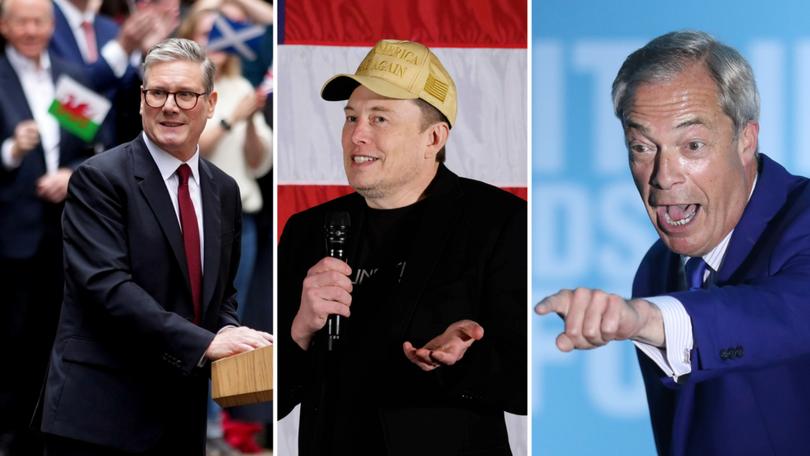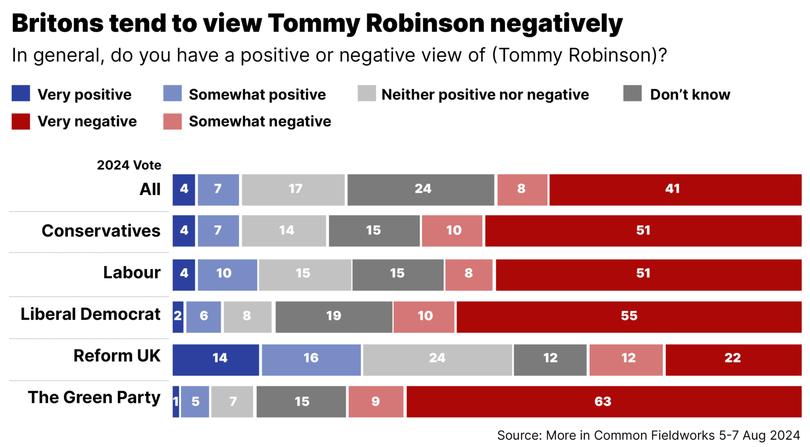LATIKA M BOURKE: Musk’s support of anti-Islam crusader Tommy Robinson is dangerous for UK Reform party
LATIKA M BOURKE: Elon Musk may end up being a frenemy of his populist brotherhood rather than Elon the Enabler

After securing himself a job, and influence as President-elect Donald Trump’s chief spear thrower, Elon Musk appears set on replicating the populist right’s success worldwide.
Last week, the billionaire social media, electric car and space company owner caused a stir in Germany when he endorsed the Alternative for Deutschland (AfD).
But his most recent intervention in the UK may even be a step too far for his political brethren in Nigel Farage’s Reform party and possibly counterproductive.
Sign up to The Nightly's newsletters.
Get the first look at the digital newspaper, curated daily stories and breaking headlines delivered to your inbox.
By continuing you agree to our Terms and Privacy Policy.Mr Musk has been berating Labour Prime Minister Sir Keir Starmer online ever since he was elected in July last year.
The sentiment was returned when the world’s richest man was notably left off the invitation list at last year’s investment summit aimed at wooing the world’s largest companies to reconsider setting up in Britain which is desperate to kick start it’s anaemic economy.
This week Mr Musk has posted numerous times urging that the far-right activist who goes by the name Tommy Robinson should be freed from British jail.
Robinson, whose real name is Stephen Yaxley-Lemmon and founded the anti-Islam English Defence League, was jailed last October after admitting to breaching a court order and repeatedly libelling a Syrian refugee schoolboy. Mr Musk reinstated Yaxley-Lemmon’s X account and has become his most high-profile supporter.
But Mr Musk’s endorsement puts his new political BFFs in Britain in an uncomfortable position.

Mr Farage has spent years trying to distance himself from Robinson and in 2018 quit his own UKIP party because of what he said was the leadership’s fixation with Robinson.
After last year’s riots in Britain, Mr Farage said in an online video: “As for the Tommy Robinsons and those that genuinely do stir up hatred, well I’ve never had anything to do with them.”
Mr Farage is hopeful of obtaining Mr Musk’s cash to bankroll Reform which enjoyed breakthrough political success in last year’s election, winning five seats despite Britain’s first-past-the-post system which makes it hard for minor parties like the Greens and UKIP to win a critical mass of seats in the House of Commons.
Since last July, Reform’s position in the polls has only risen and they have overtaken the Liberal Democrats for third position.
Reform has giant ambitions – it wants to displace the Conservatives to become the Opposition and then win power.
If that prospect was realistic, Mr Musk’s open campaigning for Robinson is kryptonite for Reform.
Mr Farage has been careful to discuss immigration with a tone that appeals to disaffected Tories and Red Wall voters that doesn’t leave him exposed to attacks from the left.
This really begs the question of how much Mr Musk even knows about the political sensitivities of the issues that he’s crashing into in other countries.
Luke Tryl from the think tank More In Common surveyed British voters about Robinson in August and found just 11 per cent had a positive view of the firebrand.
“Embracing his cause seems likely to be an anathema to electoral success,” Mr Tryl said.

“The question is whether Farage is now bold enough to hold the line on that in the face of Musk’s support.
“He either risks alienating a powerful backer or associating himself with views that are toxic with much of the electorate.
“If Reform wants to be a viable contender they have to not be seen as ‘Britain’s AfD’ with its narrow appeal and needs a brand that is seen as populist rather than far right.”
Mr Musk appears to have little appreciation for such distinctions.
He has sparked accusations of foreign interference by backing AfD ahead of Germany’s elections in February when the Left-wing Chancellor Olaf Scholz looks set to be swept from power.
Mr Musk gave his backing, naturally, in a post on his platform X, but was invited via a European-based fellow tech-bro to write an opinion piece in the German newspaper Welt am Sonntag.
He described the AfD as “the last spark of hope for this country.”
Mr Musk justified his intervention based on his Tesla business interests in Germany which is home to Mr Musk’s first European car-making plant.
But Germany’s mainstream politicians differed. Friedrich Merz who is poised to return Angela Merkel’s CDU party to power said Mr Musk’s comments were “intrusive and presumptuous.”
“I can’t remember a comparable case of interference in the election campaign of a friendly country in the history of the Western democracies,” Mr Merz said.
Born in the aftermath of the Global Financial Crisis, the AfD’s focused most heavily on harnessing the backlash to immigration, particularly from Muslim countries and the rising support for the party has raised concerns about sparking a modern form of German nationalism.
The AfD’s 2016 manifesto states that “Islam does not belong to Germany,” and that the “ever-increasing number of Muslims in the country” are a “danger” to the state, society and values.
It advocates a burqa ban and a ban on headscarves in classrooms.
On immigration, the AfD singles out Australia as a model for tailoring immigration to “social and employment conditions” and wants Australian-style immigration detention centres.
It also believes climate change is not man-made and backs scrapping renewables subsidies and reinstating nuclear.
Many of these ideas may have sounded heretical when the AfD started out but in truth, tougher immigration controls and a backlash against carbon-cutting measures that cost the everyday consumer are mainstream sentiments nearly a decade on.
But Mr Musk, in careering into the hottest of topics with little regard for their political contexts, may end up being a frenemy of his populist brotherhood rather than Elon the Enabler.

